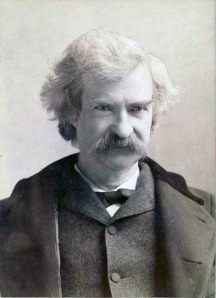“. . . ordination in the ordinary. . .” (Stephen Cushman)
October 22, 2014 Leave a comment
I wonder. I wonder if all people in their 70th year begin to work at projects they had not imagined attempting in their younger lives—or, conversely, stopped working at activities they have previously thought were important and rewarding.
How many careers can one be retired from—or begin—at age 69?
In the heart of the California Gold Rush country a replica of the cabin Mark Twin lived in for a year just after the Civil War (he was about 30) was built after the original cabin burned down. It is a California Historical Landmark because it’s where Twain wrote “The Celebrated Jumping Frog of Calaveras County.”
Mark Twain (Samuel Clemens, if you must) was born in 1835. He published his greatest work, The Adventures of Huckleberry Finn, in 1885—when he was 50. Of course, he had published a half-dozen novels before that, and numerous short stories, opinion pieces, and a biography of Ulysses S. Grant.
I’m sure many academics have written densely obtuse articles about the importance of “place” in Twain’s novels and short stories. Living in Calaveras County, California, when he wrote “Jumping frog;” in Connecticut when he wrote A Connecticut Yankee in King Arthur’s Court, etc. And a return in memory to the scene of his childhood and young man-hood, the Mississippi River, for Huck Finn.
But one does not need to play academic mind games to appreciate “place” in Huck Finn. The physical setting is obvious. Mark Twain, as a steamboat captain, knew the Mississippi “like the back of his hand” (sorry I can’t be obtuse but simply use clichés). And having grown up in the South, he knew obvious and blatant racism and discrimination, knew it to the core of his being.
And then, when he was 50, he wrote a magnificent story of love and respect. Love and respect between two men who should not have, according to the mores of their society, had anything to do with each other. Everyone knows that except for the idiots who get the novel banned from use in high schools because they know nothing of love and respect. That the sense of place in the novel is important—the Mississippi and the culture along it are characters in the story—is so obvious I’m not sure why I’m even thinking about it.
Oh, yes. Back to what I was thinking about.
About 15 years ago I was in the thick of writing my best unfinished novel. It takes place mainly in Texas, but with strong ties to (and some scenes in) Iowa and Boston. I was living in Dallas, having moved here from Boston, and I had moved to Boston after living in Iowa for my PhD work. I can’t think an original or fresh thought to save myself.
The protagonist of that shelved novel is gay. What a surprise.
There’s some damned good writing in my novel. Damned good! It would have been the dissertation for my second PhD if I had finished it. Sigh. Too late.
When I had written about 2/3rds of it, I finished my PhD exams and was about to be thrown jobless out into the big bad world. Fortunately my little non-tenure-track full-time lecturer job fell into my lap. I took it largely so I could finish my novel.
Non-tenure track faculty don’t have to attend meetings, serve on committees, or “publish or perish.” I was going to write in all that spare time. Of course, I was also Music Director at a small church and had many other obligations.
Chief among them to keep myself out of deep depressions, which I’ve managed to do most of the time.
I’d like to finish that “on-the-shelf” novel, or at least use some of the writing in another one. But it’s on 3½-inch floppy disks I have no way to use. Stuff happened. New job. Ex-wife died. Went to Palestine and had a life-changing introduction to the real world. Partner died. Mother died. Brother-in-law died. Father died. You know, stuff. I tried to go back to the writing about ten years ago and realized the person who had written all of that stuff no longer existed.
I’ve lived in Dallas almost 21 years. The longest I’ve lived anywhere. That was not my plan. A few years tops, then a professorship somewhere beautiful with my partner, and retirement in style and ease. My sense of place is so centered here I find it hard to remember Nebraska, California, Iowa, and Boston. Not really. But I remember them in ways that no longer exist.
Next month is “National Novel Writing Month.” Accept the challenge of the organization NaNoWriMo. Write a 50,000 word novel in November. Let’s see, that’s 1666.666666666667 words a day. When I’m not so distracted I can’t do anything that makes sense, I write at least 1500 words every morning. I could write 1666.666666666667 a day, but this blog would go into hibernation.
 I have something of a plot in mind. A gay 70-year-old retired writer of sociological works about racism who lives in Dallas has a family crisis with his younger brother, the owner of a small business, and his best friend, a 50-year-old woman (not a fag-hag) professor of sociology at a local university gets dragged into the middle of it all, and his other best friend, a gay 60-year-old artist steps in to save the day, and unexpectedly the protagonist and the artist discover they’ve been in love for the 20 years they’ve known each other and suddenly drive over to New Mexico and get married.
I have something of a plot in mind. A gay 70-year-old retired writer of sociological works about racism who lives in Dallas has a family crisis with his younger brother, the owner of a small business, and his best friend, a 50-year-old woman (not a fag-hag) professor of sociology at a local university gets dragged into the middle of it all, and his other best friend, a gay 60-year-old artist steps in to save the day, and unexpectedly the protagonist and the artist discover they’ve been in love for the 20 years they’ve known each other and suddenly drive over to New Mexico and get married.
Trashy enough?
Well, stay tuned. I may write a 50,000-word novel in November, and I may not. Would that be returning to an activity I once thought was insanely important? or giving up sanity for something different? What if I have a stroke next week and can’t use words anymore?
I may get around to it, and I may not. Around to it.
Today: exactly 1,000 words.
“No Place Like Home,” by Stephen Cushman
My ocean’s the one bad weather blows out to.
To face the other, waves all driven
by prevailing winds, I have to turn
my back on my family. May they forgive
this westward spree, my losing my head
to ravens that ride the thermals in circles,
to the shrub-covered bluffs of coastal scrub
and chaparral, to coons in the avocado trees;
may they not worry that I see signs
warning Great White Shark Area,
Rutting Elk May Be Aggressive,
and Hazardous Surf, or that one night two
quick earthquakes burped through the ground;
and may they repeat, when I return
slightly burned from the land of poppies,
all the lessons they ever taught me
about ordination in the ordinary.Stephen Cushman has published several collections of poetry. He is Professor of English at the University of Virginia.

